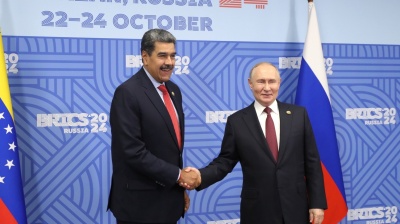The United States has conducted a second military strike against what it claims was a drug-trafficking vessel from Venezuela, killing three people and further straining already fraught relations between Washington and Caracas.
President Donald Trump announced on September 15 that he had personally authorised the attack in international waters, describing the victims as "confirmed narcoterrorists" and warning drug traffickers that American forces would "hunt you down" if they threatened US citizens.
The strike follows an earlier operation on September 2 that killed 11 people aboard a speedboat the Trump administration alleged was linked to the Venezuelan gang Tren de Aragua, designated as a foreign terrorist organisation by Washington.
Speaking to reporters at the White House, Trump displayed what he claimed was video evidence of the operation, showing packages scattered across the ocean. "All you have to do is look at the cargo that was spattered all over the ocean — big bags of cocaine and fentanyl all over the place," he said, though the Pentagon has yet to provide detailed evidence of the drugs allegedly on board.
The president also suggested that military operations could extend beyond maritime targets. "We're telling the cartels right now we're going to be stopping them, too," Trump said when asked about potential strikes on land. "When they come by land we're going to be stopping them the same way we stopped the boats."
Defence Secretary Pete Hegseth warned on X that the US would "track them, kill them, and dismantle their networks throughout our hemisphere — at the times and places of our choosing.”
The strikes have prompted sharp criticism from US lawmakers on both sides of the aisle, with concerns centring on the legality of using military force for what has traditionally been a law enforcement matter.
Additionally, human rights groups have raised alarm about potential violations of international law.
According to AP, the administration has cited self-defence as its legal justification, with Secretary of State Marco Rubio arguing that drug cartels "pose an immediate threat" to US national security. However, critics note the unusual departure from standard counter-narcotics procedures, which typically involve seizure and arrest rather than lethal force.
The strikes have occurred against a backdrop of mounting tensions, with a US naval flotilla of more than 4,500 sailors and Marines currently operating near the oil-rich country. The deployment includes seven warships capable of launching Tomahawk cruise missiles and a nuclear-powered fast attack submarine.
Venezuelan President Nicolás Maduro, whom the US does not recognise as a legitimate leader following last year’s disputed election, announced on September 15 that communications with Washington had been "severed" due to what he characterised as constant aggression. "They went from a stage of strained communication relations to a collapsed one," he said during a press conference in Caracas.
In recent weeks, the strongman president has mobilised 25,000 troops to Venezuela's border with Colombia and along the Caribbean coast, describing the US naval presence as the most serious threat the region has faced in a century. He warned that any attack on Venezuelan territory would trigger armed resistance.
The Venezuelan leader also alleged that US Marines had recently boarded a Venezuelan fishing vessel in what he described as a provocative search for a military incident. "What were they looking for? Tuna? What were they looking for? A kilo of snapper?" he asked rhetorically.
The strikes have drawn criticism from regional leaders. According to EFE, Colombian President Gustavo Petro condemned the latest attack as "murder", arguing that killing passengers on an unarmed vessel constituted an extrajudicial execution regardless of any alleged drug trafficking.
Meanwhile, Brazilian President Luiz Inácio Lula da Silva called for negotiations rather than military action, saying US forces in the Caribbean had become a source of regional tension.
In contrast, Prime Minister Kamla Persad-Bissessar of Trinidad and Tobago praised the US actions, stating: "The pain and suffering the cartels have inflicted on our nation is immense. I have no sympathy for traffickers."
Significant questions persist about both strikes. Sources familiar with a closed congressional briefing cited by AP revealed that the first vessel had turned around and was heading back to shore when attacked, raising additional concerns about the use of lethal force. The administration has not provided positive identification that either vessel was Venezuelan or that the occupants were gang members.
The Trump administration last month doubled to $50mn its reward for information leading to Maduro's arrest, accusing the Venezuelan leader of heading the "Cartel de los Soles," an alleged drug trafficking organisation whose existence is questioned by independent analysts. Rubio has stated bluntly: "We're not going to have a cartel, operating or masquerading as a government, operating in our own hemisphere."
As tensions escalate, Washington's military build-up raises the prospect of further action aimed at toppling the embattled Venezuelan regime. Trump has deployed ten F-35 fighters to Puerto Rico to conduct combat air patrols, whilst Hegseth on September 8 told deployed forces: "What you're doing right now – it's not training. This is the real-world exercise on behalf of the vital national interests of the United States."
News

Nigeria's Ondo State announces $50bn investment framework for proposed 500,000bpd refinery, free trade zone
Ondo State signed a $50bn investment agreement with a consortium of international firms, including China Harbour Engineering Company and Honeywell OUP, to build a 500,000-bpd refinery and develop a 1,471-hectare free trade zone.

Nato chief downplays US troop withdrawal, reaffirms commitment to Romania
Nato Secretary General Mark Rutte sought to ease concerns over the recent withdrawal of a US infantry brigade from Romania.

First Russian wheat train reaches Armenia via Azerbaijan as Baku-Tbilisi route reopens after decades
Azerbaijan has lifted all post-war restrictions on freight transit to Armenia.

Serbia braces for clashes as Kosovo Serbs join protests in Belgrade
Serbs from Kosovo have arrived in Belgrade after a week-long march, joining pro-government demonstrators calling for an end to over a year of student-led blockades and anti-government protests.



_1762193126.jpg)
